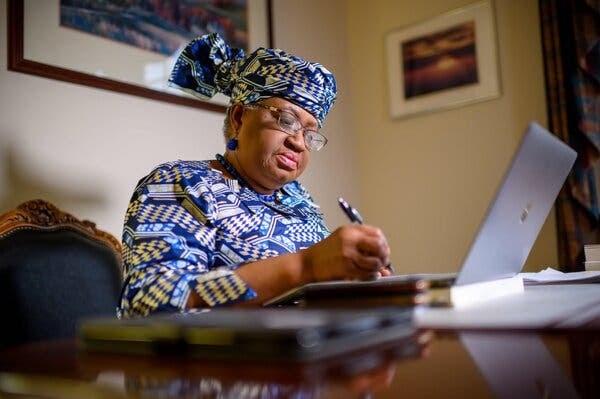A new leader reflects a changing world

Eric Baradat, Agence France-Presse
Ngozi Okonjo-Iweala prepares to take over as director-general of the World Trade Organization
On Feb. 15, Ngozi Okonjo-Iweala made history as the first woman and African to be appointed as director-general of the World Trade Organization (WTO).
As the first woman and the first African to occupy the position, Okonjo-Iweala is a symbol of the new diversity and inclusion occurring on a global scale. The 66-year-old Nigerian woman has been named a trailblazer by economists and citizens of the world. This historic first for the WTO also reflects the historic inclusion within the national government of the United States, with Kamala Harris being the first female and woman of color to hold the position of vice president of the United States.
Despite the unprecedented and trailblazing nature of her appointment, the process for Okonjo-Iweala to obtain her new position was long and difficult. Though her appointment was originally blocked by the Trump administration according to National Public Radio (NPR), she was able to overcome all obstacles to win the position. The race started with eight candidates, which was slowly whittled down to two: Ngozi Okonjo-Iweala and Yoo Myung-hee, South Korea’s trade minister. The Trump administration backed Myung-hee during the process, effectively blocking the appointment of any candidate due to WTO’s policy of choosing director-generals based on complete consensus. After his election, Biden voiced his support for Okonjo-Iweala, allowing for her appointment to move forward.
However, according to Nigerian news source Channels TV, there is still some controversy over her appointment. Because of the historic diversity her appointment creates, some worry that she obtained the position due to favors caused by diversity, and not because she earned it.
Despite concerns and controversy, the new head of the WTO is qualified for the position. According to NPR, Okonjo-Iweala graduated from Harvard University in 1976, and went on to earn a PhD from the Massachusetts Institute of Technology. After her education, she built her career in economics, focusing on working for disenfranchised international groups.
According to an article from the New York Times, “She’s been a fixture on the international stage, speaking frequently on issues like climate change, public health and global development.”
In addition to her work focused on public health and climate change, Okonjo-Iweala also has an impressive background in economy and finance. In Nigeria, she was a finance minister from 2003 to 2006, and from 2011 to 2015. In 2006, she also served as a foreign minister in Nigeria. She made history in both positions as the first woman to be the finance minister and foreign minister in Nigeria.
Her term officially begins on March 1, and should last until August 2025. Despite her qualifications and background in economics, taking over as director-general of the World Trade Organization during the middle of a pandemic will be difficult.
As the new director-general, Okonjo-Iweala inherits a World Trade Organization plagued with problems caused by the COVID-19 pandemic, economic tension between the United States and China and the United States possibly breaking WTO rules by boosting tariffs. Despite this plethora of problems, the WTO has aligned their priorities with the rest of the world by focusing on helping to end the pandemic.
Okonjo-Iweala has emphasized that her first priority is to reverse the economic and health issues exacerbated by the COVID-19 pandemic.
“A strong World Trade Organization is vital if we are to recover fully and rapidly from the devastation wrought by the COVID-19 pandemic,” she said in a WTO statement. “I look forward to working with members to shape and implement the policy responses we need to get the global economy going again.”
Sophomore psychology major Hannah Grace MacLean believes that the inclusion of historically marginalized groups in positions of leadership is an important way to ensure no one is left behind while tackling the pandemic.
“(Okonjo-Iweala through her work with disenfranchised peoples) understands how social inequalities and economic disparities are being exacerbated by COVID-19,” MacLean said, reasoning that this experience will help the WTO focus on people disproportionately impacted by the pandemic.
The intersectionality of her racial and gender identity also intrigued MacLean.
“I think her appointment is a huge deal because she is both the first woman and the first African to hold this position,” she stated, focusing on the new normal of the expanding standards for diversity and inclusion.
MacLean hopes that the appointment of Ngozi Okonjo-Iweala and Kamala Harris will lead to more representation of marginalized groups in positions of power in the future.









